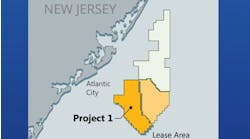Partners aim to develop automated verification of offshore wind inspection data
Offshore staff
OSLO, Norway – DNV has launched a collaborative research project to develop an automated data processing procedure for verification of detected wind turbine blade defects.
The research project, which is being conducted in partnership with the University of Bristol and Perceptual Robotics, will investigate the automated verification, validation and processing of inspection data, collected by autonomous drones, to improve inspection quality and performance. The project aims to contribute to the development of the UK automated inspection industry.
It also aims to build trust and generate broader acceptance of automated data processing techniques across the industry and to inform future regulation, DNV said.
Unmanned autonomous and remote-controlled vehicles and drones are routinely used to conduct asset inspections in the hard to reach, extreme environments of offshore wind farms. These vehicles can collect rich and extensive data sets including high-definition video, images, geo-positioning and sensor data, to provide integrity information about the installed structures without personnel having to access these dangerous locations.
The research project, which will run for 12 months from April 2021, will address the need for fully automated processing of the data collected, where currently this remains a semi-automated process with reliance on visual inspections of image data by trained experts.
As part of the project, the Visual Information Lab at the University of Bristol will create algorithms for automated localization of inspection images and defects using SLAM and 3D tracking technology.
Perceptual Robotics will perform drone inspections and create AI based models for defect detection to trial automation of process in a commercial production environment.
DNV will provide inspection expertise, verify data collected, validate the methodology and performance of the AI algorithms and provide guidance as to existing DNV and IEC recommend practices, regulations and industry networks.
According to DNV, the research is supported by an Innovate UK grant gained as a result of winning the Robotics for a safer world: extension competition.
05/13/2021



